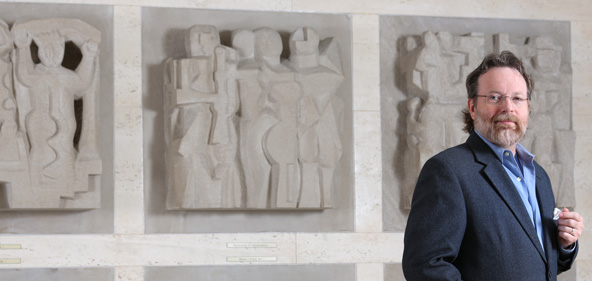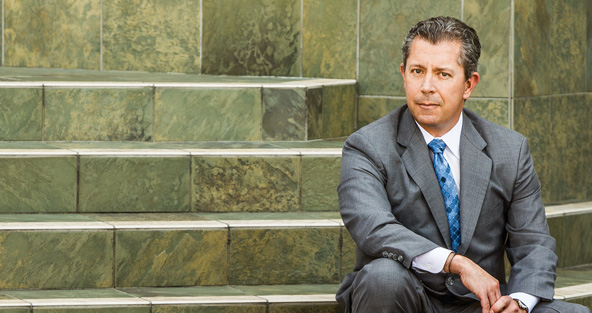Can You Be a Lawyer Again After Being Disbarred
Features
Disbarred lawyers who seek reinstatement have a rough road to redemption

Kenneth Lawson: "I was thinking 'You'll never be happy again.' But I'm feeling useful again. I don't make nearly as much money as I used to, and it's not about being happy. It's about being at peace. Giving is the only way I can receive that. I think my actions speak for where I'm at. If I'm not admitted, so be it." Photograph by Marco Garcia.
Kenneth L. Lawson sits in his office at the University of Hawaii's law school and gazes out the window at a view of Diamond Head.
"Does God have a sense of humor, or what?" he muses.
Hawaii may feel like heaven, but for Lawson it carries a touch of purgatory.
Lawson was a Cincinnati attorney who built a notable criminal defense practice after receiving his Ohio license in 1989.
In 2008 Lawson's wife, Marva, moved to Hawaii with their three children to join the medical staff at a Honolulu hospital. But that September Lawson was indicted in federal court in Ohio on felony charges of conspiracy to obtain controlled substances, primarily prescription drugs like Percodan and OxyContin.
His schemes to obtain the prescriptions involved his physician, who wrote an estimated 700 to 800 prescriptions between 2004 and 2007, many of which were written in other people's names.
Lawson agreed to plead guilty. In April 2009, he was sentenced to 24 months in federal prison, one year of supervised release and 1,000 hours of community service. By the time Lawson was indicted, the Ohio Supreme Court had already decided to suspend his license to practice law. The court cited a list of wrongdoings, including failing to properly represent 15 clients, not returning unearned fees, stealing settlement funds from half a dozen clients, misusing his IOLTA account, and failing to cooperate with the investigation into his disciplinary case.
Ruling in Cincinnati Bar Association v. Lawson, on July 9, 2008, the court described his "pervasive pattern of professional misconduct." But the court also noted his efforts to address his chemical dependence and left the door open to an eventual return to law practice.
In September 2011, however, the guillotine fell on Lawson's legal career in Ohio. It turns out that a second disciplinary complaint had been filed against him that finally brought the full scope of his criminal wrongdoing to the supreme court's attention.
This time, the court said "an indefinite suspension would fall short of protecting the public, which this court has articulated is the primary goal of the attorney disciplinary system. … Although respondent attempts to minimize his criminal acts and illegal conduct involving moral turpitude by arguing that he did not distribute medications to others, the cumulative nature of respondent's misconduct … merits disbarment."
But while Lawson was in Hawaii waiting to be sentenced, the head of the state bar's lawyer assistance program introduced him to Randall W. Roth, a law professor at the University of Hawaii's William S. Richardson School of Law. Roth talked to him at length about the toll taken by his addiction. He asked Lawson to speak to students in his professional responsibility class.
"I was sitting in the front of the room across from Ken, so I was looking at the 100 or so students and just watching how riveted they were. It was so obviously difficult for Ken. He hadn't had the opportunity to stand up in front of a group like that and share his darkest moments," Roth says. The students gave him a standing ovation; and one of them, Roth later learned, sought help from the Hawaii lawyer assistance program that day.
"That was the first time I'd ever spoken to a group outside of treatment or recovery," recalls Lawson. "While I was there to speak, Randy introduced me around at the university. That's how I met the director of the Hawaii Innocence Project, and she offered me a job. Giving without expecting anything in return has actually turned out to be a better way of life for me."
Lawson now speaks openly about his fall—actually, speaking might be what he does most. His job as associate director of the law school's Hawaii Innocence Project has evolved into a nontenured faculty position. (He eventually rejoined his family in Honolulu after his release from prison in March 2010.)
Yet despite Lawson's turnaround since leaving prison, what he plans to do next amounts to throwing a Hail Mary pass. He says he will apply for admission to the Hawaii bar and sit for the February bar exam. Regaining his law license isn't necessary for Lawson to continue his career; he says he doesn't want to practice law again. He admits, however, that he would like to be able to go into court to guide students working with the project and to teach trial practice courses.
"I'll have to go through the character and fitness review, and I don't know how they'd treat my disbarment," he says. "All I'm going to do is what I can do, which is apply."

Jonathan Coughlan: "In Ohio, there's no such thing as reinstatement after disbarment—which includes being disbarred, resigning with discipline pending, or asking to retire and having that request accepted. Zero. Period. Do you know the definition of disbarment? It means you're gone. It doesn't allow you to come back. I tell my colleagues all the time: 'If you want to allow the possibility of return, fine. But don't call it disbarment.'" Photo by Peter Coe.
LOOKING AT THE NUMBERS
While it's not impossible for a disbarred lawyer to gain reinstatement, the odds are not in the lawyer's favor, and few even try. Data collected for the most recent ABA Survey on Lawyer Disciplinary Systems indicates that 674 petitions, motions or requests for reinstatement or readmission (which adds retaking the bar exam to other requirements for reinstatement) were filed during 2011 in the jurisdictions that responded. But only 67 applications for reinstatement after disbarment were successful, according to the survey. (The survey does not have results from Connecticut, Hawaii and Oklahoma, and has only partial results from New York.)
Nevertheless, even minuscule numbers of successful applications for reinstatement suggest there is hope, and most states offer at least the possibility of reinstatement. "The process has been changing," says Dennis A. Rendleman, counsel to the ABA Standing Committee on Ethics and Professional Responsibility. "In the past, disbarment was frequently the death penalty, so there really was no return. It's also evolved from when disbarment was the only penalty other than some type of censure, and there were very few in-betweens."
However, he adds, "over the past 30 years, states and disciplinary bodies have developed a range of sanctions, including different levels of suspension. But at the same time, in many places, disbarment has again become the death penalty. It's become very difficult to come back from disbarment because that's saved for the most serious offenses."
Lawson's native Ohio is one of the death penalty states. "In Ohio, there's no such thing as reinstatement after disbarment—which includes being disbarred, resigning with discipline pending, or asking to retire and having that request accepted," says Jonathan E. Coughlan, the disciplinary counsel for the Ohio Supreme Court in Columbus. "Zero. Period. End of story."
Coughlan doesn't even like to speak of "reinstatement after disbarment." He says, "Do you know the definition of disbarment? It means you're gone. It doesn't allow you to come back. I tell my colleagues all the time: 'If you want to allow the possibility of return, fine. But don't call it disbarment.' It's an oxymoron."
Data from the Survey on Lawyer Disciplinary Systems, which was published in May, supports the notion that disbarment is the ultimate sanction. In 2011, according to the survey, 652 lawyers were involuntarily disbarred nationwide, up from 503 in 2010. An additional 394 consented to disbarment, up from 290 in 2010. Those disbarment totals accounted for just over 0.08 percent of the U.S. population of 1.27 million active practicing attorneys at the end of 2012, a number based on headcounts collected from the states and territories by the ABA Market Research Department.
Nor is there consensus among state supreme courts and disciplinary agencies over which disbarred lawyers should be reinstated. Some consider financial impropriety unforgivable, while others are more tolerant when a lawyer misuses funds to pay the bills, as opposed to pocketing the money for personal gain. Some favor reinstatement after effective treatment of substance abuse or mental health issues. Others worry, however, that even if these conditions are treated, it's often too risky to allow reinstatement.
John Gleason, who in March became disciplinary counsel and director of regulatory services at the Oregon State Bar, says that even non-"death penalty" states require disbarred lawyers to wait a number of years before seeking reinstatement. In Colorado, where he previously served as attorney regulation counsel, the waiting period can be up to eight years.
"My experience is that lawyers who are disbarred are generally unhappy with their work as a lawyer. They've probably found a position they're happy in and have no interest in coming back," says Gleason. "It's a fairly low percentage of lawyers who seek reinstatement."
In some states, disbarred lawyers may have to take the bar exam again in addition to applying for readmission—and agree to a full character and fitness review, as well as a hearing. Since California added a bar exam requirement in 2010, the number of lawyers seeking readmission has dropped. In 2009, 22 lawyers petitioned for readmission, says Kristin L. Ritsema, senior trial counsel at the State Bar of California in Los Angeles. Since the bar exam requirement was added, only 29 lawyers have filed to be reinstated, an average of about nine per year.
And the process is not cheap. The filing fee in California is about $1,500, in addition to the bar exam fee, says Murray B. Greenberg, a senior trial counsel at the state bar and the president of the National Organization of Bar Counsel. Most applicants are represented by counsel, which adds to their costs. Warren Lupel, special counsel at Much Shelist in Chicago, has represented lawyers and judges in professional responsibility cases for the past 30 years. His charges range from $20,000 to $25,000. And he says that amount isn't even the high end for fees in such cases.
"Overall, the reinstatement process is very humbling, almost humiliating, and it's onerous and very expensive," Lupel says. "You have to denude yourself and your family of everything—everybody's health records, financial records, including every debt you've incurred—and you go through all that when you're paying the lawyer a substantial amount of money."
And yet some lawyers are willing to put themselves through the wringer. Lupel once represented a real estate lawyer who had gone to prison for fraud. Lupel advised the 75-year-old against seeking reinstatement, but the client insisted. He lost. The client came back four years later after a heart transplant; but this time, Lupel refused to represent him.
"I told him I didn't get it," says Lupel: " 'You're 80, you know you don't have much time left. You're going to pay me $20,000 to $25,000, and you're not going to win. Why?' He said, 'I want on my tombstone that I was a lawyer.' I think that's in the mind of a lot of people. They confuse their career with their life."

Dennis Rendleman: "In the past, disbarment was frequently the death penalty, so there really was no return." But, "over the past 30 years, states and disciplinary bodies have developed a range of sanctions, including different levels of suspension. But at the same time, in many places, disbarment has again become the death penalty. It's become very difficult to come back from disbarment because that's saved for the most serious offenses." Photo by Katarina Wittkamp.
CHANGING ATTITUDES
The relationship between lawyer misconduct and substance abuse or mental health issues is a key area where disciplinary agencies have revised their thinking, Rendleman says. "Many of the disciplinary agencies have done a very good job of identifying where there are substance abuse issues so that probation or mentorship and oversight have come into play," he says. "They've done a very good job in many states of diverting cases where there's a legitimate medical issue so it doesn't go the disbarment route."
That change in approach is crucial to the way that many disciplinary cases are handled, says Sarah L. Krauss, a retired judge in New York City who chairs the ABA Commission on Lawyer Assistance Programs. She estimates that mental health or substance abuse issues are a factor in at least half of lawyer disciplinary cases. "Work around the United States through LAP programs has brought everybody's consciousness up a bit," she says. "We've been at this for more than 25 years, and we've seen more interaction between LAPs and not only disciplinary counsel, but also character and fitness committees on who should be admitted in the first place."
The thinking on when to reinstate lawyers whose disbarments were linked to mental health or substance abuse issues is evolving, Krauss says. "Most states have a time rule before they'll allow reinstatement, and the generally accepted time is seven years," she says. Some states look to the regulatory practices of other professions—physicians, for instance.
"What we know about the physicians' recovery process—we often work with them and share information—is that medical professionals usually monitor physicians for five years. That's the minimum amount of time before they can apply for reinstatement."
Some states focus on lawyers' efforts after disbarment to atone for their wrongdoing. That involves such steps as acknowledging the wrongdoing, making restitution and taking concrete steps toward rehabilitation, especially in cases involving addiction.
Still, some actions are hard to overcome, even in states with a fairly high tolerance level. The most obvious, says Gleason, is a failure to pay fees imposed as a result of the disbarment, including court costs, restitution or reimbursement of the state client protection fund. Also damaging is a failure to seek counseling or treatment for underlying addiction or mental health issues. Another fairly easy call would be any post-disbarment criminal convictions.
Disciplinary authorities also may review the underlying offense; some are considered too damning to overcome. "People who've been convicted of a felony and served time in prison for a crime related to the profession—maybe they defrauded someone—I'd tell them not to bother," Lupel says. "I'd also tell a person convicted of crimes related to sexual dysfunction not to bother, including sexual assault, something with a child or pornography. Those kinds of crimes, even though they don't directly relate to the profession, are so appalling that the persons who hear reinstatements simply aren't going to permit that person to rejoin the profession. People who've been guilty of converting clients' funds, even if it's in a single matter, are also highly unlikely to regain their license."

Samuel Bellicini: "Getting disbarred is horrendous, and you really have to try hard to get disbarred in any jurisdiction. I perfectly understand some jurisdictions' decision to refuse to consider any reinstatement. There comes a point where you say enough's enough. I'm lucky to be alive. My law license is a very distant second to the fact that I'm vertical and breathing now. I'm 11 years clean and sober, and that's a miracle. I never lose sight of that." Photo by Eric Millette.
GOING TO EXTREMES
But courts in some states are willing to let disbarred lawyers make their pitch for reinstatement even in extreme cases.
Ritsema says California does not specify any acts that preclude reinstatement; and a 2000 case on admission, which she says also applies to reinstatement, shows that California courts won't summarily dismiss reinstatement petitions even after seemingly heinous acts. In the case In re Gossage, the California Supreme Court denied admission to an applicant who had been convicted of involuntary manslaughter. Eben Gossage "killed his sister in a drug-induced rage, and he didn't get in," Ritsema says. But, she adds, "even in that case, the court left the door open to the idea that even someone who kills another human being is worthy of admission or reinstatement given the right circumstances."
The court described the ugly details of Gossage's fatal bludgeoning of his sister, and acknowledged his contention that she attacked him first with a hammer and scissors. The court went on to note that he failed to render assistance and later concealed his involvement. It also noted that Gossage had been convicted of several counts of theft and forgery. Even so, it found that he could be admitted "if the evidence shows that he is no longer the same person who behaved so poorly in the past, and only if he has since behaved in exemplary fashion over a meaningful period of time."
Yet the court ruled that he failed to meet what it termed that "heavy burden." In the six years before entering law school and completing the bar exam, the court said, Gossage "repeatedly violated state traffic laws and sustained several misdemeanor convictions for mishandling these matters in court." He also failed to make full disclosure of those and other issues on his application for admission.
Five years ago, the Tennessee Supreme Court also issued a ruling asserting that sometimes disbarred lawyers have burned too many bridges to gain reinstatement.
"We don't have permanent disbarment," says Lucian T. Pera, a partner at Adams and Reese in Memphis, Tenn., a past president of the Association of Professional Responsibility Lawyers and current ABA treasurer. "However, in 2008, despite a remarkable amount of evidence, a lawyer was denied reinstatement because the court found the underlying offense too grave."
In 1997, Dennis Hughes was convicted of bribing a witness and conspiracy to bribe a witness in a criminal trial. He had previously been sanctioned for misconduct many times and consented to disbarment after the bribery convictions. In 2004, Hughes petitioned for reinstatement after seeking treatment for alcoholism. Fifteen witnesses, including judges and attorneys, testified in support of his reinstatement; more than 60 others submitted letters in support.
But in Hughes v. Board of Professional Responsibility (PDF), the Tennessee Supreme Court found that his prior misconduct, combined with his felony convictions, demonstrated "a pattern of behavior over a period of years that conflicts with the standards of the bar, the sanctity of our judicial system and the public trust. His reinstatement to the practice of law at this time would be detrimental to the standing of the bar, the administration of justice and the public interest."
Justice Janice M. Holder, then serving as chief justice, dissented. Citing the court rules governing the reinstatement process, she wrote: "We have chosen, however, not to make disbarment permanent for even the most serious offenses, opting instead to allow all disbarred attorneys to seek readmission and have the merits of their petitions judged on a case-by-case basis. … The majority's opinion in this case effectively shuts the door on the ability of certain petitioners to be readmitted. … I do not believe it is consistent with the rules governing readmission."
The case leaves Tennessee lawyers with conflicting guidance on the possibility of reinstatement after disbarment, says Pera. "It would be nice if we could have some framework for decision-making that would be more predictable, but I'm not sure it's possible," he says. "A lot of times, it's just based on gut—and sometimes that's good."

Photo by Marco Garcia.
COMING BACK FROM THE DEAD
So what is Lawson up against if he pursues his plan to seek admission in Hawaii? He has performed good works, made strong efforts to change his personal behavior and address his addictions, and acknowledged his past wrongdoing. People like law professor Roth are ready to go to bat for him. But will that be enough?
A primary roadblock is likely to be that Lawson's legal career is over in Ohio, a death penalty state, no matter what he does to change his ways.
"If an attorney has been disbarred in one state, it's highly unlikely another state will admit that attorney," says Rendleman. "Many states' admission rules also say you can't have been disbarred in another state." Hawaii is one of those states. But Hawaii is also not a death penalty state. The state supreme court rules require a disbarred lawyer to wait five years before applying for reinstatement, but it's unclear whether that rule would apply to a lawyer seeking admission in Hawaii after being disbarred in another state.
It's also unlikely that Ohio disciplinary authorities will intrude on Hawaii's admission process. "They don't have to ask us for anything," Coughlan says. "But they're going to make him fill out a very lengthy application, and that will include a question like: 'Have you ever been disciplined in another jurisdiction?' He has to prove to Hawaii his present fitness, and that's not stuff I can comment on."
And it's unlikely that Hawaii's lawyer disciplinary agency would play a direct role in considering an application for admission from Lawson, says Charlene Norris, deputy chief disciplinary counsel in the Office of Disciplinary Counsel for the Hawaii Supreme Court. "The Board of Bar Examiners handles admission; we don't," she says. "However, a lawyer seeking reinstatement in Hawaii who's been disbarred in another state would have to be reinstated in their own state first." Rochelle R. Hasuko, secretary to the board of examiners, confirms that applicants for admission must be in good standing in any foreign jurisdiction in which they've been licensed.
Other states generally have the same rule. Colorado authorities, for instance, would "have to decide what to do with someone who's done everything right and wants to come to Colorado but is from a death penalty state," Gleason says. Would one state's supreme court "essentially ignore the decision of a sister state on disbarment?" he says. "It's another issue when our court has to look at another state and overturn what that state has done. That's a huge hurdle."
That's also why Gleason is not a fan of permanent disbarment. "I've never understood it, and that's going to piss off my colleagues throughout the country," he says. "I'm a huge proponent of lateral entry. I believe all these artificial barriers to lawyers moving around the country are ridiculous, and here's yet another barrier placed in the line of people who've done everything right after they've done something wrong, and we're going to continue to punish them. I don't understand that—and I'm ready for all the phone calls from my colleagues."
Gleason adds, "Their position is there are certain violations of trust that are so sacred to the practice of law that you're never going to get back in again. I think a lot of my colleagues around the country miss the boat. I don't believe our position is to punish lawyers but to protect the public and regulate lawyers."
Samuel C. Bellicini, however, sees the reasoning behind permanent bans. Alcohol and gambling problems led to his resignation from the California bar in 1993. He was reinstated in 2008 and is now an associate at Fishkin & Slatter in Walnut Creek, Calif., which advises lawyers on a variety of professional conduct matters, including defense representation in state bar disciplinary investigations and proceedings.
"Getting disbarred is horrendous, and you really have to try hard to get disbarred in any jurisdiction," Bellicini says. "I perfectly understand some jurisdictions' decision to refuse to consider any reinstatement. There comes a point where you say enough's enough." For him, being reinstated was almost beside the point. "I'm lucky to be alive," he says. "My law license is a very distant second to the fact that I'm vertical and breathing now. I'm 11 years clean and sober, and that's a miracle. I never lose sight of that."
Lawson expresses a similar view. "I was thinking 'You'll never be happy again,' " he says. "But I'm feeling useful again. I don't make nearly as much money as I used to, and it's not about being happy. It's about being at peace. Giving is the only way I can receive that. I think my actions speak for where I'm at. If I'm not admitted, so be it."
Roth—who says he doesn't view himself as a particularly trusting person—believes Lawson deserves another chance to practice law. But even if that doesn't happen, Roth is confident that Lawson has turned the corner in his life.
"I think he's truly a transformed person," Roth says. "I just happen to believe this guy is ready, and the message that would send to other lawyers who've fallen and to society at large would be huge. It's so important that people always have hope, no matter how far they've fallen and how bleak things may be. But the beauty is, if the decision-makers don't agree, I'm convinced he'll work just as hard for others as he would as a lawyer. It's not that he'll do just fine. He'll be an inspiration."
Correction
Print and initial Web versions of "The Rough Road to Redemption," August, should have calculated the disbarment totals for 2011 at just over 0.08 percent of the 1.27 million practicing U.S. attorneys at the end of 2012.
The ABA Journal regrets the error.
G.M. Filisko is a lawyer and freelance writer in Chicago.
Give us feedback, share a story tip or update, or report an error.
Source: https://www.abajournal.com/magazine/article/disbarred_lawyers_who_seek_reinstatement_have_a_rough_road_to_redemption
Post a Comment for "Can You Be a Lawyer Again After Being Disbarred"